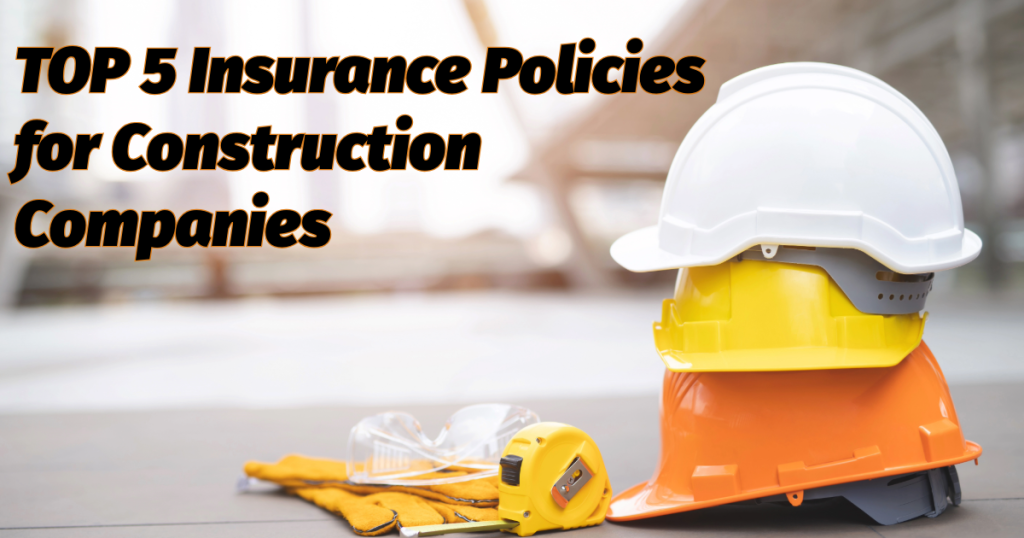
The construction industry is inherently risky. From workplace accidents to property damage and project delays, construction companies face many challenges that can lead to significant financial losses. Having the right insurance coverage is not just a safety net—it’s necessary to protect your business, employees, and clients.
In 2025, as construction projects become more complex and regulations more stringent, ensuring you have the right insurance policies in place is more important than ever. Here are the top 5 insurance policies every construction company needs to safeguard its operations:
1. General Liability Insurance
What It Covers:
General Liability Insurance is the foundation of any construction company’s insurance portfolio. It protects your business from third-party claims of bodily injury, property damage, and personal injury (e.g., slander or libel).
Why You Need It:
- Accidents happen on construction sites, and if a visitor or subcontractor is injured, you could be held liable.
- If your work causes damage to a client’s property, this policy will cover the repair costs.
- It’s often required by clients before you can bid on or start a project.
Example Scenario:
A worker accidentally damages a client’s adjacent property while operating heavy machinery. General Liability Insurance would cover the repair costs and legal fees if the client sues.
2. Workers’ Compensation Insurance
What It Covers:
Workers’ Compensation Insurance provides coverage for medical expenses, lost wages, and rehabilitation costs if an employee is injured or becomes ill due to their work.
Why You Need It:
- Construction is one of the most dangerous industries, with a high risk of workplace injuries.
- Most states require businesses with employees to carry Workers’ Compensation Insurance.
- It protects your business from lawsuits related to workplace injuries.
Example Scenario:
A worker falls from scaffolding and suffers a broken leg. Workers’ Compensation would cover their medical bills and a portion of their lost wages during recovery.
3. Builder’s Risk Insurance
What It Covers:
Builder’s Risk Insurance (also known as Course of Construction Insurance) protects buildings and structures under construction. It covers damage caused by fire, theft, vandalism, and severe weather.
Why You Need It:
- Construction sites are vulnerable to theft, vandalism, and natural disasters.
- It ensures that your project can continue even if unexpected damage occurs.
- Most lenders and clients require this coverage before financing or approving a project.
Example Scenario:
A fire breaks out on a construction site, damaging the partially completed structure. Builder’s Risk Insurance would cover the cost of repairs or rebuilding.
4. Commercial Auto Insurance
What It Covers:
Commercial Auto Insurance covers vehicles owned or used by your business. It includes liability coverage for accidents, as well as physical damage coverage for your vehicles.
Why You Need It:
- Construction companies often rely on trucks, vans, and heavy equipment for transportation and operations.
- Personal auto insurance policies typically don’t cover vehicles used for business purposes.
- It protects your business from costly lawsuits and repair expenses.
Example Scenario:
A company truck is involved in an accident while transporting materials to a job site. Commercial Auto Insurance would cover the damage to the truck and any third-party injuries or property damage.
5. Professional Liability Insurance (Errors and Omissions)
What It Covers:
Professional Liability Insurance, also known as Errors and Omissions (E&O) Insurance, protects your business from claims of negligence, mistakes, or failure to deliver on contractual obligations.
Why You Need It:
- Construction projects often involve design, consulting, and project management services.
- If a client claims your work caused delays, cost overruns, or structural issues, this policy will cover legal fees and settlements.
- It’s especially important for architects, engineers, and design-build firms.
Example Scenario:
A client alleges that a design error led to costly delays in their project. Professional Liability Insurance would cover the legal defense and any resulting settlements.
Bonus Tip: Umbrella Insurance
While not specific to construction, Umbrella Insurance provides additional liability coverage beyond the limits of your other policies. It’s a cost-effective way to add an extra layer of protection for your business.
Why These Policies Matter in 2025
The construction industry is evolving rapidly, with new technologies, stricter regulations, and increasing client expectations. In 2025, having the right insurance policies isn’t just about compliance—it’s about ensuring your business can thrive in a competitive and unpredictable environment.
By investing in these top 5 insurance policies, you can:
- Protect your business from financial losses.
- Build trust with clients and partners.
- Ensure compliance with legal and contractual requirements.
- Focus on growing your business with peace of mind.
Next Steps for Your Construction Business
Don’t wait until an accident or lawsuit happens to review your insurance coverage. Take the time to assess your risks and ensure you have the right policies in place. Work with an experienced insurance provider who understands the unique challenges of the construction industry.
If you’re unsure where to start, reach out to us today. We’ll help you tailor an insurance plan that meets your specific needs and keeps your business protected in 2025 and beyond.
Contact us today for a Free Insurance Consultation!
